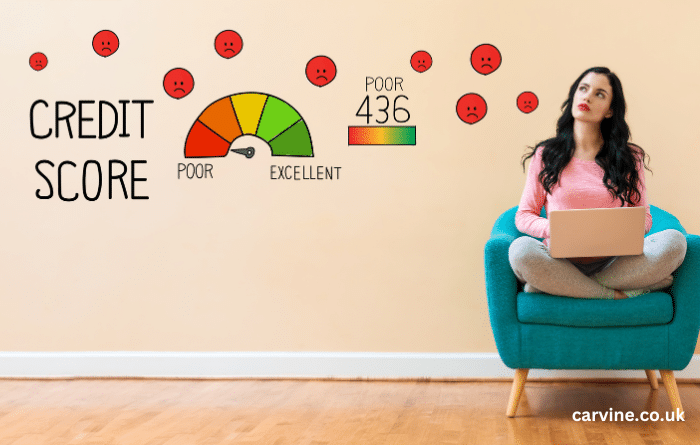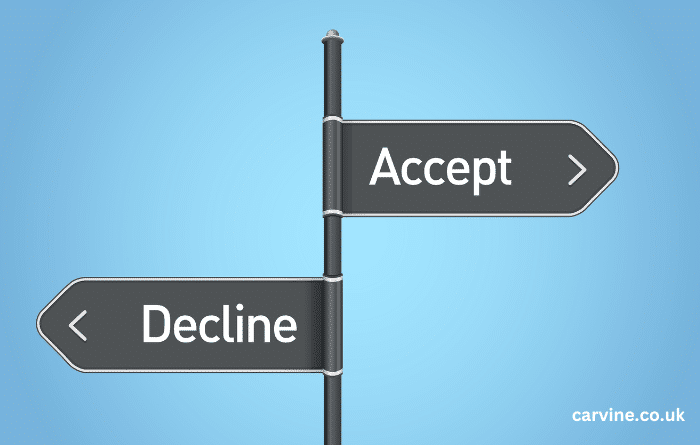Can You Buy a Car with a 550 Credit Score in the UK? A 550 credit score might sound like a roadblock if you’re in the market for a car in the UK, but don’t let it deter you. You’re far from alone; many people find themselves in this low credit rating bracket. This guide will equip you with the knowledge you need to a good credit score and improve your chances of getting car finance, so read on to explore the legalities and tips involved.
Car Loan Requirements: What You Need to Know
If you are looking for a car loan you must satisfy certain requirements. To increase your chances of securing a an auto loan, you’ll need to:
- Compare various financing options and understand the interest rates involved.
- Gather essential documents like proof of income, residential address, and a working phone number.
- Be clear about your budget and the additional expenses you’d be taking on with car ownership.
Doing this homework gives you a leg-up in the competitive world of car finance, where credit scores are important.
Your Rights and Responsibilities: A Balance
Understanding your rights and responsibilities when looking for car finance is crucial. It protects you from falling into the traps set by predatory lenders and helps you make an informed decision. You should:
- Be wary of any hidden fees and read the fine print meticulously.
- Always research different financing options before finalising your decision.
- Ask questions if you’re unsure about any terms.
So, while a 550 credit score does limit your payment options, remember that you still have choices.
Types of Cars: Choosing Wisely
When it comes to the types of cars available, the choices can be mind-boggling. From engine sizes to boot space, there’s much to consider:
- Compare different models and take note of their features.
- Keep in mind the long-term maintenance costs, not just the upfront price tag.
- Always check safety ratings. After all, what’s more important than your safety?
Doing this helps you zoom in on the car that’s just right for your needs and budget.
Exploring the Used Car Market

Often overlooked, the used car market could be a gem, especially when you’re looking for a car loan and working with a less-than-stellar credit score or know you have bad credit. Some pointers for this avenue of a poor credit score are:
- Compare interest rates offered by different lenders.
- Understand the approval process and the role your credit score plays.
- Look into bad credit car finance options as these could be more forgiving.
The used car market might just have the vehicle that meets both your needs and your own credit score and potential limitations.
Finding a Reliable Seller: Crucial Steps
A reliable seller isn’t just an advantage; it’s a necessity. Be it local dealerships or online portals, you must:
- Verify the condition of the vehicle.
- Do some digging into its history.
- Keep an eye out for hidden costs or fees.
In essence, you’re not just buying a car but also buying peace of mind.
Car’s History: What to Check
Before parting with your hard-earned money, make sure to delve into the car’s history. Look at:
- Previous ownership and any history of accidents.
- If the mileage listed is genuine and aligns with the car’s condition.
- Maintenance records to gauge how well the car has been looked after.
This helps you to avoid any nasty surprises down the line.
Take a Test Drive: More than Just a Spin
Sure, the car looks great on paper, but how does it feel on the road? A test drive is not just a formality; it’s a crucial part of the car-buying process. When you’re behind the wheel, notice how the car responds. Listen for any odd sounds or vibrations.
Negotiating the Price: How to Get the Best Deal
Finally, we get to the matter of price. To get the best deal, arm yourself with information:
- Know the trade-in value of your current car, if applicable.
- Research pricing at multiple dealerships.
- Don’t hesitate to walk away if you feel you’re not getting a fair deal.
Register and Insure Your New Car
After you’ve sealed the deal, you’ll need to register and insure your new vehicle. Both are legal requirements in the UK, and the specific processes can vary.
- Check local requirements for vehicle registration.
- Shop around for the best insurance policy and rates.
Don’t forget about bad credit van finance as an option if you’re considering a larger vehicle for work or personal use.
Long-Term Financial Planning: Beyond the Purchase

Now that you’ve got the car, it’s time to think ahead. A 550 credit score suggests there may be room for improvement in your financial health down payment amount. If you financed your car with a higher interest rate due to your adverse credit report or lower credit scores, consider that a short-term fix. Focus on improving your credit score for future financial stability and opportunities.
Budgeting for Maintenance and Other Costs
Owning a car isn’t just about the initial cost or monthly payments. Consider running costs such as petrol, insurance, MOT tests, and regular maintenance. Budgeting for these can save you a lot of financial stress down the line.
Refinancing: An Option Worth Considering
As you start to improve your credit score, you might be eligible for a better rate on your car loan. Refinancing could potentially save you a significant amount of money over the life of your loan. However, ensure that the benefits outweigh the costs, such as fees or penalties for early repayment of your original loan.
Upgrading Your Vehicle: When Is the Right Time?
As you continue to make payments on your current vehicle and possibly improve your credit score, you might start thinking about an upgrade. A better credit score will give you access to better financing options. But before you jump in, consider how well your current car is serving your needs and whether it’s economically sensible to make a change.
Insurance: Making the Right Choice
Insurance is a recurring annual expense. Consider shopping around each year to see if you can get a better deal than your current provider offers. Lots of comparison websites are tailored for audiences with a less than perfect credit score to help you find the best price for your needs.
Regular Checks and MOT
In the UK, cars older than three years require an annual MOT (Ministry of Transport) test to ensure they meet safety and environmental standards. Missing your MOT can result in a fine and potentially invalidate your insurance, so keep this in mind. It may not seem like this will affect your credit score but it is a factor that the major credit bureaus will consider in your application.
Being a Responsible Car Owner
Owning a car is both a convenience and a responsibility. In addition to regular maintenance, driving responsibly is important to minimise wear and tear on your vehicle and help prevent accidents. This also has the added benefit of potentially lowering your insurance premiums over time, as a good driving record can qualify you for various discounts.
Staying Up-to-Date on Paperwork
Never underestimate the importance of keeping all your vehicle-related paperwork up to date. This includes your V5C logbook, insurance documentation, and any financing paperwork. Make sure you know when your road tax is due and set reminders for yourself so you renew it on time to avoid penalties.
Future Resale Value
Keep an eye on the future resale value of your car. Certain makes and models hold their value better than others, and keeping your car in good condition can also contribute to a higher resale value. Even if you plan to keep your car for many years, its future value should always be a consideration.
Improving Your Credit Scores for Future Purchases

While its possible you may have secured a car loan with credit scores of 550 or below, working to improve your credit score can offer you more financial freedom in the future. . Regular payments, on-time payments on other loans and your car loan, has been shown to impact credit scores positively. Beyond that, try to:
- Pay down any existing debts.
- Keep credit card accounts and balances low.
- Avoid taking on additional debts.
- Regularly check your credit report for errors and have them corrected.
- Never miss a monthly payment
- Set a budget and stick to it to help your finances. The risk from lower credit scores affects the overall cost of car loans.
Working toward improving your credit rating (credit score) is impacted upon by your payment history and will have an effect upon the size of the deposit (sometimes called a down payment) you will need to take out a car loan. Credit bureause and providers of auto loans will take this and your credit mix into consideration and some borrowers will not be offered the same lower interest rates favoured by a lender that can offer a better interest rate.
Trade-Ins and Selling Your Car

If you financed a car with a high interest rate due to a lower credit score, it might be tempting to trade it in for a better model once you have a higher credit score and credit score history improves. However, be cautious of rolling over any remaining balance on your old car loan into a new loan; this can result in a cycle of debt that’s hard to break.
Conclusion
While a 550 credit score may limit your financing options in the UK, it doesn’t make both car loans and ownership impossible. The key is to be informed, responsible, and proactive. Keep track of your obligations as a car owner and make consistent efforts to improve your credit score for future financial ventures. Car ownership can be an exciting journey, one that doesn’t have to be hindered by a less-than-perfect credit score. With diligent planning and responsible action, you’ll be on the road to financial health and the freedom that comes with it.




